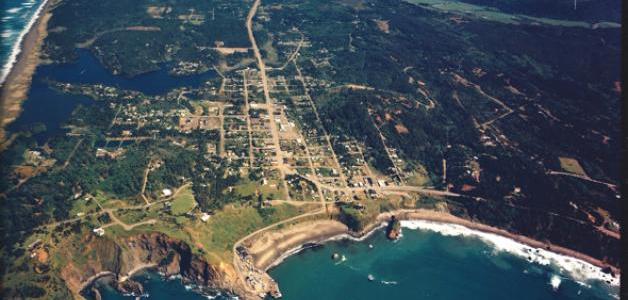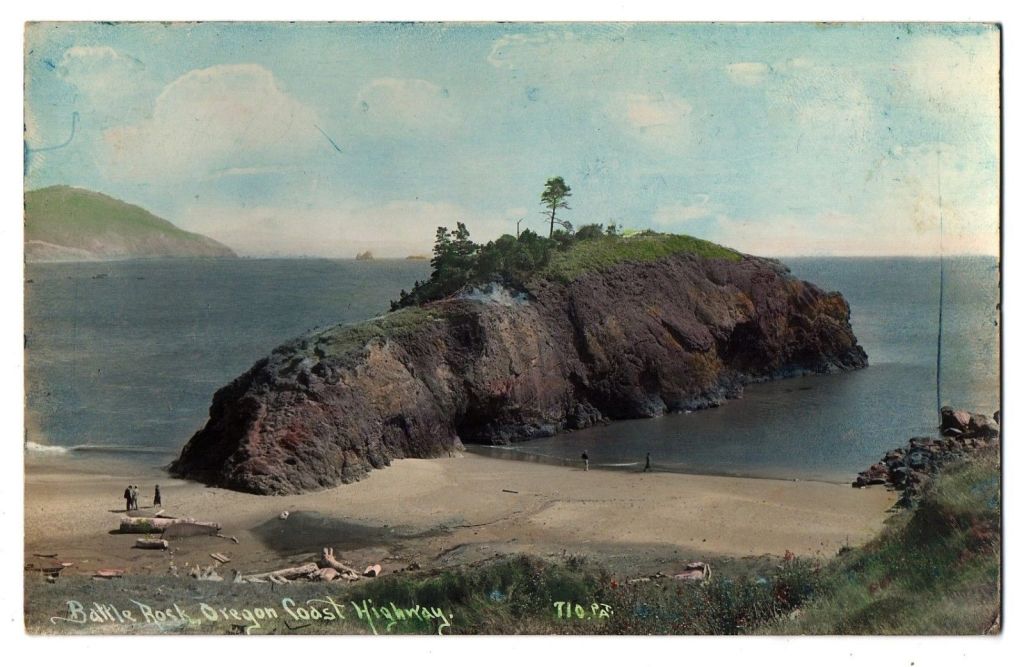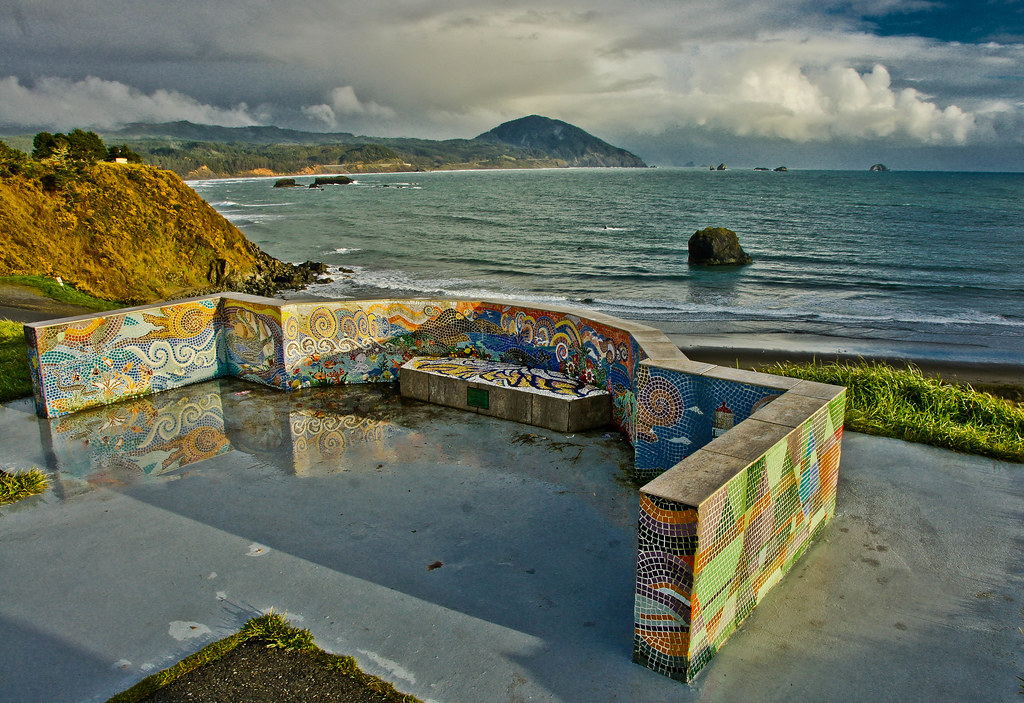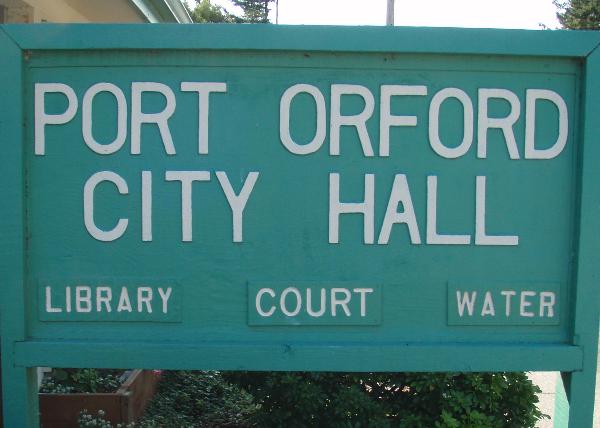When it comes to the proposed golf course, the end seems to be receding far into an uncertain future of roughs and hazards. Especially water hazards.
Speaking of uncertainties, what is up with this supposed project? For years it’s gone by the name of Pacific Gales, with a flashy Web site. But that’s just a blank space now. IT’S GONE And when the developer, Elk River Property Development, came to the Port Orford City Council on January 18 for a “workshop,” the agreement they presented referred to it as “the TBD golf course.”
Some kind of game is going on here, and it isn’t golf.
On the 18th, ERPD teed up a draft Sewer Treatment Facility Water Use Agreement [ see it below ], hoping for a quick approval at the regular council meeting that followed. The council didn’t go that far, but did suggest another workshop, with ERPD’s engineering firm, The Dyer Partnership, to be held prior to the March city council meeting. Even two months away, this is wildly premature.
What has paused the construction of the pipeline for eight years now is ERPD’s failure to complete the Department of Environmental Quality’s permitting process. Under Oregon law, in order to be able to apply recycled water for a beneficial purpose, such as landscape irrigation of a golf course, an applicant must first obtain both a National Pollutant Discharge Elimination System (NPDES) permit and a Water Pollution Control Facility (WPCF) permit from DEQ. This is to protect the quality of groundwater for public health as well as for the environment.
ERPD got the secondary discharge point on the proposed golf course piggybacked onto the NPDES permit for Port Orford’s wastewater treatment plant during a past renewal. The WPCF permit is solely the responsibility of ERPD, but they deliberately haven’t completed the Recycled Water Use Plan (RWUP) they need in order to get it.
A DEQ official confirmed: “I heard from Troy Russell last year after the city received fund[s] from the state legislature for water recycling (SB948 …), but I don’t have an update[d] recycle[d] water use plan from him yet. The application is a Water Pollution Control Facilities ‘individual’ permit.” This procrastination has enabled ERPD to come back to Port Orford for repeated extensions of their conditional use permits. Why? Because they don’t want to admit they don’t have enough money for their project. It’s just easier to blame DEQ for permitting delays that are ERPD’s own fault.
We suspect they would like to use their proposed water use agreement with Port Orford to escape the need for CUP extensions once and for all. But they can’t ignore state mandates, which are detailed and complex.
General Requirements for Permitting the Use of Recycled Water
Briefly, they include DEQ approval of
- NPDES and WPCF permits
- a recycled water use plan
- compliance with rules for use of recycled water on land zoned Exclusive Farm Use
- any additional requirements DEQ may specify to protect public health and the environment
- a water right from the Oregon Water Resources Department
- a separate NPDES permit if wetlands and/or groundwater are affected
These are not simply check-box forms, which completely deflates ERPD’s claim at the workshop that they just have to work out some additional chlorination of the recycled water, and then they’re good to go.
For further information, you can view the relevant Oregon Administrative Rules at DEQ, Chapter 340, Division 55, Recycled Water Use. HERE
But wait. There’s more.
Construction of the pipeline must also be approved by DEQ before work can begin. “Without first obtaining a permit from the Director, a person may not:
… Construct, install, modify, or operate any disposal system or part thereof or any extension or addition thereto …” (Chapter 340, Division 45, Regulations Pertaining To NPDES And WPCF Permits, Section 0015) HERE
Underline that last paragraph and highlight it.
It’s reinforced under Submittal of Plans: “No construction, installation or modification shall be commenced until the plans and specifications submitted to the Department are approved.” ERPD cannot even begin work until it has permits in hand, plus DEQ approval of the engineering. (Chapter 340, Division 052, Section 0015) HERE
In addition, as owner of the sewage system that is the source of the recycled water, the City of Port Orford needs to pay close attention to the OARs that govern its duties regarding plans for the pipeline.
“The owner of the sewerage system (generally a municipality) as recipient of any construction work on its system has a vested responsibility to review and approve project plans prior to the start of construction. Department approval of plans under these rules does not preclude the right and responsibility of review and approval by the owner. The owner may adopt more stringent construction standards and impose special conditions for sewer use, service connection, and related activities.” (Chapter 340, Division 052, Section 0040; emphasis supplied) HERE
Then, if the applicant gets to this stage in the process, yet another NPDES permit is required — to monitor stormwater discharges to surface waters from construction and industrial activities. LINK
Public Notice and Participation Requirements for Permitting Actions
Last, but certainly not least as far as the public is concerned, notice will be required when issuing a new WPCF. There will be at least 35 days to submit written comments. If a hearing is scheduled, 30 days’ notice is required. DEQ may determine that a hearing is necessary, OR members of the public may request one. LINK
Whew. Let’s say the quiet part out loud — ERPD has a very long way to go and many steps to take before its pipeline is shovel ready. And we can guarantee it won’t be happening in spring 2024.
Meanwhile, the city council should make no commitments, sign no agreements, and hand out no money (especially not any of the $750,000 the legislature gave the city) until this project is much closer to completion. If it ever is. Otherwise the city would be buying a pig in a poke — with taxpayer money.
That isn’t the way a public-private partnership is supposed to work.







You must be logged in to post a comment.